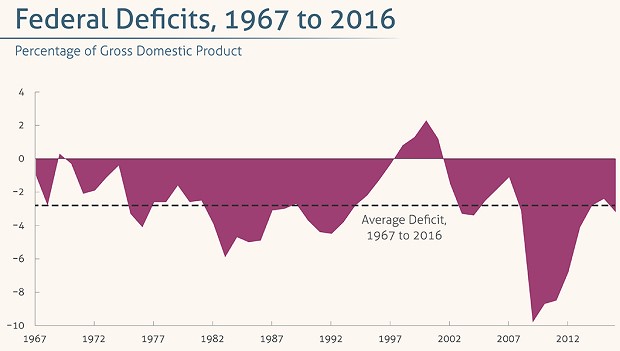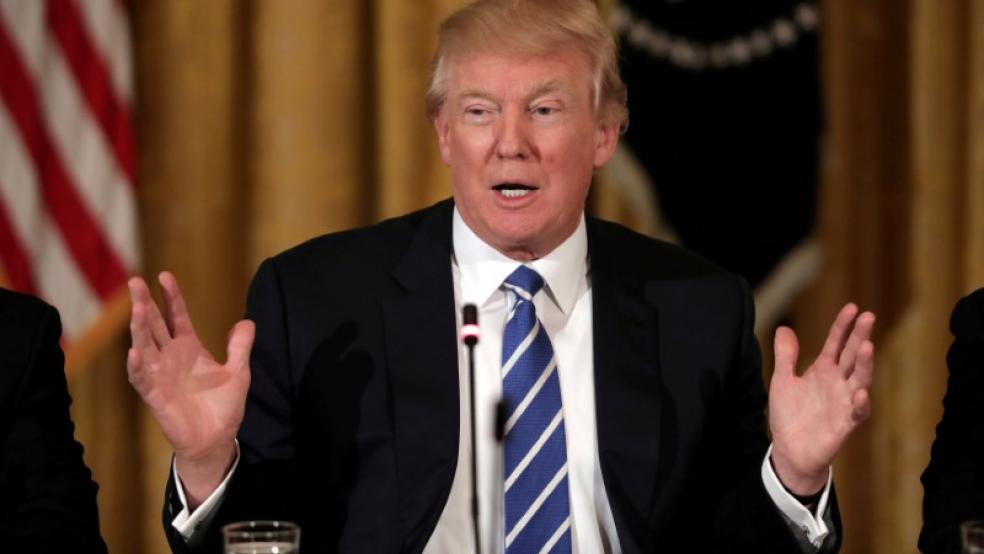President Trump may have rendered himself irrelevant to the budget debate this year.
By submitting a budget that postpones consideration of the long-term debt while calling for deep cuts in domestic programs that even his GOP allies denounce as draconian, Trump and his budget director Mick Mulvaney may be taking themselves out of the game before it even gets started.
Related: The Five Biggest Winners and Losers in Trump’s Fiscal 2018 Budget
A day after Trump formally submitted his “America First” budget sketch to Congress that focuses exclusively on discretionary defense and domestic programs while kicking consideration of the debt and entitlement spending to a later time, the preliminary verdicts rolling in from Capitol Hill and independent budget analysts is that Trump’s approach shouldn’t be taken seriously.
Trump has called for a $54 billion increase in defense spending next year to insure U.S. military supremacy around the world, while insisting that it be offset dollar-for-dollar by cuts in spending for domestic programs and the general operation of the federal government.

Source: Congressional Budget Office
Rep. Hal Rogers of Kentucky, the former chair of the House Appropriations Committee and a highly regarded voice on fiscal matters, told reporters Thursday that while Trump’s efforts to avoid adding to the deficit are commendable, “I am disappointed that many of the reductions and eliminations proposed in the president’s skinny budget are draconian, careless and counter-productive.”
Rogers, like many Republican veterans on Capitol Hill, stressed that Congress controls the federal purse strings and that the president’s defense and domestic spending proposals will undergo intense scrutiny – and almost certain change.
Related: Did Trump’s Budget Chief Really Say Cutting Meals Programs Is ‘Compassionate’?
Coming from a real estate businessman and former reality TV host renowned for his bargaining prowess, Trump’s budget proposal might suggest to some a shrewd opening bid, with the understanding the White House and congressional leaders eventually would compromise on spending levels much to the liking of the new president.
Yet many of Trump’s proposed cuts -- ranging from 12 percent for the departments of the Interior and Housing and Urban Development to an eye-popping 29 percent for the State Department and 31 percent for the Environmental Protection Agency – are so out of line with long-established, bipartisan spending norms that they have virtually no chance of coming even close to what eventually will be approved.
Steve Bell, a former Senate Republican budget official now with the Bipartisan Policy Center, dismissed Trump’s budget as little more than political “messaging” to his conservative base and a wish list of massive cuts to social safety-net, research and arts programs that conservative think tanks like the Heritage Foundation have been advocating for years.
Bell’s service on Capitol Hill dates back to the Reagan administration of the 1980s, when a new Republican president and GOP-dominated Senate sought to scale back the size of government by freezing or significantly cutting domestic programs, including the school lunch program.
“I know all presidential budgets have a messaging component to them, but this [Trump proposal] seems to me only a messaging type budget,” Bell said in an interview Friday. “And it’s aimed at people who don’t know much about where spending in the federal government really goes … There’s a certain vindictiveness to it that I never saw in the Reagan budget.”
Related: Trump’s NIH Budget Cuts Threaten a Serious Setback in Medical Research
Trump ran on a highly mixed populist message of downsizing an entrenched Washington bureaucracy and whacking away at a national debt fast approaching $20 trillion while simultaneously pledging an historic buildup of the military and homeland security and major tax cuts to spur the economy.
It has been clear for many months that Trump’s budget math will never add up. For all of his lip service to fiscal restraint, budget and tax analysts have repeatedly projected that Trump’s policies will add trillions of dollars to the national debt in the coming years.
Mulvaney, the new director of the Office of Management and Budget and a former Tea Party Republican House member from South Carolina, stressed in press briefings this week that the budget unveiled on Thursday was never intended to address Social Security, Medicare and other major entitlement programs that are the main drivers of deficit spending.
That conversation will be put off until later this spring, at the earliest, which means that decisions on domestic and defense spending must be made in a political vacuum with little consideration of how discretionary spending fits into the larger challenge of slowing the growth of the deficit. After years of decline, the deficit has begun to climb again and likely will reach $441 billion this year.
Related: Trump’s ‘Hard Power’ Budget Gives Billions to Defense, Guts Domestic Programs
Asked during a news conference on Thursday how Trump intends to deal with the nation’s festering debt problems, Mulvaney replied: “It’s a fair question. I would just suggest to you it’s not the right time for the question. The budget blueprint, again, does not deal with the debt. It even doesn’t even deal with the deficit. It is simply the first part of the appropriations process.”
Government spending watchdogs have argued for years that only a more comprehensive, holistic approach of discretionary spending cuts, entitlement reforms and tax increases will achieve a balanced budget and long-term fiscal stability. “By focusing only on discretionary spending, this budgets effectively ignores 70 percent of spending and 90 percent of its growth over the next decade,” writes Marc Goldwein, senior vice president and policy director at the Committee for a Responsible Federal Budget.
Trump ruled out changes to Social Security and Medicare during the campaign and for now he appears to be sticking to his guns. Tax increases are also out of the question. Trump and congressional Republican leaders are planning to unveil plans for massive corporate and individual tax cuts later this spring or summer.
So in the future, Trump will have little wiggle room politically other than to insist on more cuts to domestic programs and foreign aid and hope that his tax cuts will eventually produce the 4 percent annual GDP growth he is promising to expand the economy and generate more government revenue to offset spending.
“The fact is that until the president and Congress are willing to address the real drivers of our debt, Medicare and Social Security, we will be complicit in shackling future generations with the financial burden of our own lack of discipline,” Sen. Bob Corker (R-TN) said Thursday. “This is not a legacy I want to leave.”
The Navy’s $35 Million Scandal: Hookers, Booze and a Guy Named ‘Fat Leonard’




